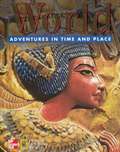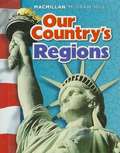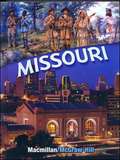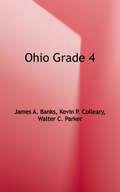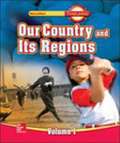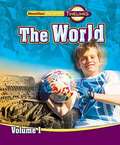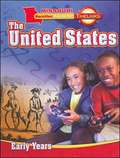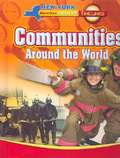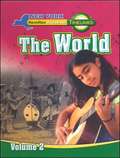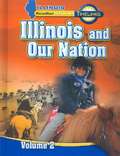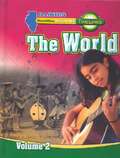- Table View
- List View
United States: Adventures in Time and Place
by James A. Banks Walter C. Parker Gloria Ladson-Billings Barry K. Beyer Gloria Contreras Jean Craven Mary A. McfarlandAn overview of the history of the US.
World: Adventures in Time and Place
by James A. Banks Gloria Ladson-Billings Barry K. Beyer Gloria Contreras Jean Craven Mary A. Mcfarland Walter G. ParkerThis textbook contains unit lessons on Understanding the World, River Valley Civilizations, New Ideas and New Empires, World Regions in Transition, Dawn of the Modern World and A Century of Conflict.
Gente y Lugares (Grade 1, Edicion para Texas)
by James A. Banks Kevin P. Colleary Walter C. Parker Gloria Contreras Mary A. Mcfarland A. Lin Goodwin Richard BoehmA Spanish textbook that teaches about culture, history, people and places.
Ohio
by James A. Banks Walter C. Parker Gloria Contreras Mary A. Mcfarland A. Lin Goodwin Richard O. Boehm Kevin P. ColleoryThis book examines the geography, history, and economy of Ohio.
Our Country's Regions
by Richard G. Boehm James A. Banks Kevin P. Colleary Gloria Contreras A. Lin GoodwinOur Country's Regions
Our Nation 5th Grade
by Richard G. Boehm James A. Banks Kevin P. Colleary Walter C. Parker Gloria Contreras Mary A. Mcfarland A. Lin GoodwinTextbook about the US.
Our Nation: Beginnings through 1877 (5th Grade)
by Richard G. Boehm James A. Banks Kevin P. Colleary Walter C. Parker Gloria Contreras Mary A. Mcfarland A. Lin GoodwinOur Nation is the key to unlocking the exciting story of our nation's history for all middle grades students. Authors focus on the "why" of history--helping students make meaning of what happened long ago, why it happened, and how it remains important to us today.
People and Places 2nd Grade (California Vistas)
by Jana Echevarria James A. Banks Kevin P. Colleary Walter C. Parker Emily M. Schell Stephen F. Cunha James J. Rawls Rosalia SalinasThis book contains sections on Families Long Ago, Exploring Our Earth, How Government Works, Our Needs and Wants, and Many Special People. The book has additional features: Reference Section, Skills and Features, Charts, Graphs, Diagrams and Maps.
Making A New Nation: California Vistas 5
by Jana Echevarria James A. Banks Kevin P. Colleary Walter C. Parker Emily M. Schell Stephen F. Cunha James J. Rawis Rosalla SalinasA history book set in accordance with California learning standards.
California Vistas: Ancient Civilizations
by Jackson J. Spielvogel Jana Echevarria James A. Banks Kevin P. Colleary Walter C. Parker Emily M. Schell Stephen F. Cunha James J. Rawls Rosalia SalinasThis volume has five units which include: Early Humans; The First Civilizations; Ancient India, China, and Central America; Ancient Israel and Greece; and the Rise and Fall of Rome.
Macmillan/McGraw Hill Timelinks: Indiana in the Nation and the World
by James A. Banks Kevin P. Colleary Linda Greenow Walter C. Parker [et al.]Social Studies textbook
The United States Early Years
by The Editors of MacMillan/McGraw-HillHistory textbook for 5th Grade
Indiana Timelinks: People, Places and Culture in Europe and the Americas [Grade 6]
by Dinah Zike James A. Banks Kevin P. Colleary Linda Greenow Walter C. Parker Emily M. SchellNIMAC-sourced textbook
New York
by James A. Banks Kevin P. Colleary Walter C. ParkerThe study of New York State and United States history requires an analysis of the development of American culture, its diversity and multicultural context, and the ways people are unified by many values, practices, and traditions. Important ideas, social and cultural values, beliefs, and traditions from New York State and United States history illustrate the connections and interactions of people and events across time and from a variety of perspectives. Study about the major social, political, economic, cultural, and religious developments in New York State and United States history involves learning about the important roles and contributions of individuals and groups.
Missouri (Grade #4)
by James A. Banks Kevin P. Colleary Walter C. ParkerMISSOURI invites students to be a participant in Missouri's story from its earliest peoples to the challenges of today. Each unit is developed around the BIG IDEAS of social studies that help students focus and gain a deeper understanding of the Missouri Academic Content Standards. The Missouri program builds geographic mastery with map and chart skills, offers reading skills and strategies to reinforce Reading/Language Arts, and integrates Dinah Zike's FoldablesTM to help students improve comprehension. This program also features rich literature selections, primary sources, and Readers' Theaters that bring Missouri history alive, citizenship pages that show real-life participation in democracy, and biographies that help students learn about the lives of people who have made a difference throughout Missouri's history. The program includes Missouri Academic Content Standards for each lesson, as well as built-in Missouri Test Preparation in every unit assessment.
Ohio Grade 4
by James A. Banks Kevin P. Colleary Walter C. ParkerThis book is organized to help you understand and apply social studies content and skills as you read. -Unit Opener and People Who Made a Difference pages introduce you to the people and places in the unit. - Chapter Opener pages introduce you to the time and place of events you will read about. - Lesson Opener pages prepare you before you read. - Lesson Review pages test your understanding of the lesson. -Reading Skills pages help you understand social studies content. - Biographies and Primary Sources bring the past alive. - Citizenship pages show real-life participation in democracy. -Readers' Theater and Literature bring Ohio history alive.
Our Country And Its Regions (Older Elementary Social Studies)
by McGraw-Hill Education EditorsEvery grade level is designed with colorful, powerful images and readable text to make Social Studies more relevant than ever before.
The World Volume 1 (Macmillan/McGraw-Hill TIMELINKS)
by McGraw-Hill Education Staff6th Grade Social Studies Textbook
Missouri Timelinks: Grade 5
by Macmillan Mcgraw-HillMacmillian/McGraw-Hill TIMELINKS builds geographic mastery with maps and skills, offers reading skills and strategies to reinforce Reading/Language Arts skills.
Timelinks: Communities Around The World (New York Edition)
by Macmillan Mcgraw-HillMacmillan/McGraw-Hill TIMELINKS New York Edition Grade 1 (and grade 2) builds geographic mastery with maps and skills, offers reading skills and strategies to reinforce Reading/Language Arts skills, and integrates Dinah Zike's Foldables® to help students improve comprehension. It has been written to address the New York Academic Content Standards and integrates grade-level content and skills into every lesson. *Five content area readers: Citizenship, Culture, Economics, Geography, History *
Timelinks: The World, Volume 2 (New York Edition)
by Dinah Zike James A. Banks Kevin P. Colleary Linda Greenow Walter C. Parker Emily M. SchellMacmillan/McGraw-Hill TIMELINKS New York Edition Grade 4 (or grade 5 or 6) builds geographic mastery with maps and skills, offers reading skills and strategies to reinforce Reading/Language Arts skills, and integrates Dinah Zike's Foldables® to help students improve comprehension. It includes New York Academic Content Standards for each lesson, as well as built-in New York Language Arts Test Preparation in every Unit assessment. * Two volumes per grade * Available as single copies or in grade level sets
IL TimeLinks: Illinois and Our Nation
by Macmillan Mcgraw-HillThis edition includes Illinois Learning Standards for each lesson, as well as built-in Illinois Standards Achievement Test Preparation in every Unit assessment.
The World: Volume 2 (Illinois Timelinks)
by Macmillan Mcgraw-HillThis Illinois Edition offers reading skills and strategies to reinforce Reading/Language Arts skills, and integrates Dinah Zike's Foldables® to help students improve comprehension. This edition includes Illinois Learning Standards for each lesson, as well as built-in Illinois Standards Achievement Test Preparation in every Unit assessment.

